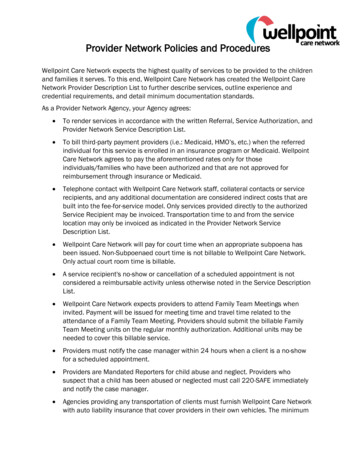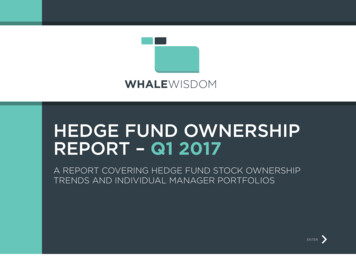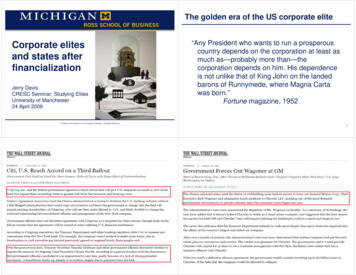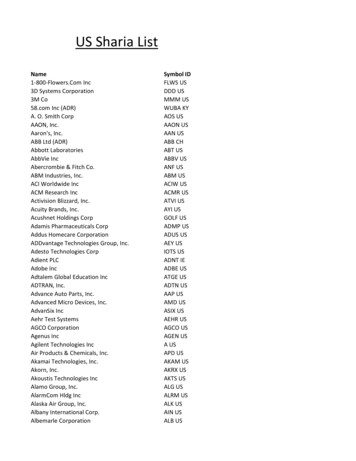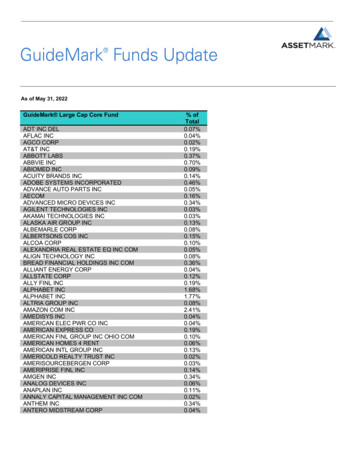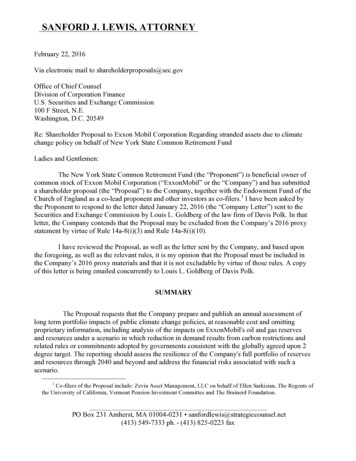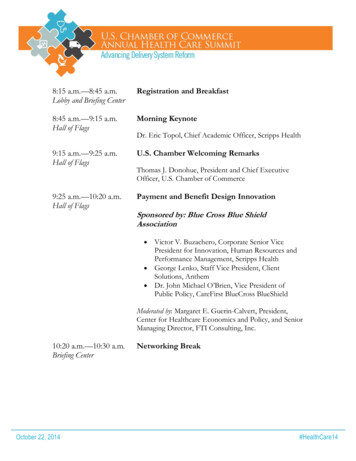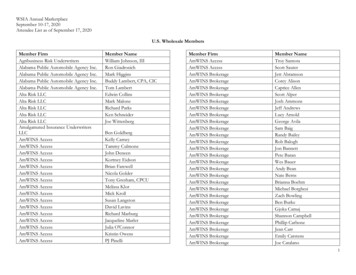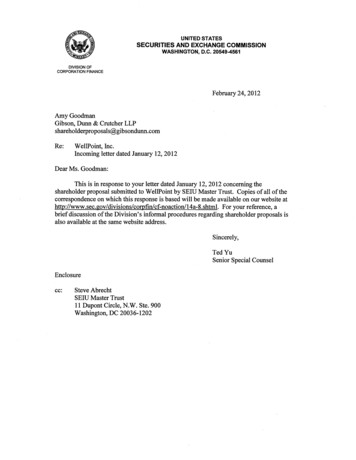
Transcription
UNITED STATESSECURITIES AND EXCHANGE COMMISSIONWASHINGTON, D.C. 20549-4561DIVISION OFCORPORATION FINANCEFebruary 24,2012Amy GoodmanGibson, Dunn & Crutcher LLPshareholderproposals gibsondunn.comRe: WellPoint, Inc.Incoming letter dated Januar 12,2012Dear Ms. Goodman:This is in response to your letter dated January 12,2012 concerning theshareholder proposal submitted to WellPoint by SEIU Master Trust. Copies of all of thecorrespondence on which this response is based wil be made available on our website 4a-8.shtmL. For your reference, abrief discussion ofthe Division's informal procedures regarding shareholder proposals isalso available at the same website address.Sincerely,Ted YuSenior Special CounselEnclosurecc: Steve AbrechtSEIU Master Trust11 Dupont Circle, N.W. Ste. 900Washington, DC 20036-1202
February 24,2012Response of the Offce of Chief CounselDivision of Corporation FinanceRe: WellPoint, Inc.Incoming letter dated January 12,2012The proposal requests that the board adopt a policy that the chairman shall be anindependent director according to the definition set forth in the New York StockExchange listing standards.There appears to be some basis for your view that WellPoint may exclude theproposal from its proxy materials under rule 14a-8(i)(3), as vague and indefinite. Wenote in paricular your view that; in applying this particular proposal to WellPoint, neithershareholders nor the company would be able to determine with any reasonable certaintyexactly what actions or measures the proposal requires. Accordingly, we wil notrecommend enforcement action to the Commission if WellPoint omits the proposal fromits proxy materials in reliance on rule 14a-8(i)(3).Sincerely,Angie KimAttorney-Adviser
DIVISION OF CORPORATION FINANCEINFORML PROCEDURES REGARING SHARHOLDER PROPOSALSThe Division of Corporation Finance believes that its responsibility with respect tomatters arsing under Rule 14a-8 (17 CFR 240.14a-8), as with other matters under the proxyrules, is to aid those who must comply with the rule by offering informal advice and suggestionsand to determine, initially, whether or not it may be appropriate in a paricular matter torecommend enforcement action to the Commission. In connection with a shareholder proposalunder Rule 14a-8, the Division's staff considers the information fuished to it by the Companyin support of its intention to exclude the proposals from the Company's proxy materials, as wellas any information fushed by the proponent or the proponent's representative.Although Rule 14a-8(k) does not require any communcations from shareholders to theCommission's staff, the staffwil always consider information concerning alleged violations ofthe statutes administered by the Commission, including argument as to whether or not activitiesproposed to be taen would be violative of the statute or rule involved. The receipt by the staffof such information, however, should not be construed as changing the staff s informalprocedures and proxy review into a formal or adversar procedure.It is important to note that the staffs and Commission's no-action responses toRule 14a-8G) submissions reflect only informal views. The determinations reached in these noaction letters do not and canot adjudicate the merits of a company's position with respect to theproposal. Only a court such as a U.S. District Cour can decide whether a company is obligatedto include shareholder proposals in its proxy materials. Accordingly a discretionardetermination not to recommend or take Commission enforcement action, does not preclude aproponent, or any shareholder of a company, from pursuing any rights he or she may have againstthe company in cour, should the management omit the proposal from the company's proxymateriaL.
GIBSON DUNNGibson, Dunn & Crutcher LLPl O O Con nect icut Aven ue. N.W.Washington, DC 2003 6 - : ()6Tel 20 2.%5 .8500www.gi bsondu nn.comAmy GoodmanDirect: 1 202.955.8653Fax: 1 202.530.9677AGoodman@gibsondunn.comClient: 98407-00001January 12, 2012VIA EMAILOffice of Chief CounselDivision of Corporation FinanceSecurities and Exchange Commission100 F Street, NEWashington, DC 20549Re:We llPoint, Inc.Shareholder Proposal ofSEIU Master TrustExchange Act of1934- Rule 14a-8Ladies and Gentlemen:This letter is to inform you that our client, WellPoint, Inc. (the "Company"), intends to omitfrom its proxy statement and form of proxy for its 2012 Annual Meeting of Shareholders(collectively, the "2012 Proxy Materials") a shareholder proposal (the "Proposal") andstatements in support thereof received from the SEIU Master Trust (the "Proponent").Pursuant to Rule 14a-8G), we have: filed this letter with the Securities and Exchange Commission (the"Commission") no later than eighty (80) calendar days before the Companyintends to file its definitive 2012 Proxy Materials with the Commission; and concurrently sent a copy of this correspondence to the Proponent.Rule 14a-8(k) and Staff Legal Bulletin No. 14D (Nov. 7,2008) ("SLB 14D") provide thatshareholder proponents are required to send companies a copy of any correspondence thatthe proponents elect to submit to the Commission or the staff of the Division of CorporationFinance (the "Staff'). Accordingly, we are taking this opportunity to inform the Proponentthat if the Proponent elects to submit additional correspondence to the Commission or theStaff with respect to the Proposal, a copy of that correspondence should be furnishedconcurrently to the undersigned on behalf of the Company pursuant to Rule 14a-8(k) andSLB 14D.Brussels ' Century City · Da ll as' Denver · Dubai Hong Kong · London' Los Angel es ' Munich' New YorkOrange County· Palo Alto ' Paris· San Fran cisco · Sao Pau lo · Singapore' Washington, D.r.
GIBSON DUNNOffice of Chief CounselDivision of Corporation FinanceJanuary 12,2012Page 2THE PROPOSALThe Proposal states:RESOLVED, that shareholders of Well point, Inc. ("Wellpoint") urge theboard of directors to adopt a policy that the board's chairman be anindependent director according to the definition set forth in the NewYork Stock Exchange ("NYSE") listing standards, unless Well point'sstock ceases to be listed on the NYSE and is listed on another exchange,at which time that exchange's standard of independence should apply.The policy should provide that if the board determines that a chairmanwho was independent when he or she was selected is no longerindependent, the board shall promptly select a new chairman who isindependent. Compliance with this policy should be excused if nodirector who qualifies as independent is elected by shareholders or if noindependent director is willing to serve as chairman. This policy shouldbe applied prospectively so as not to violate any contractual obligationof Wellpoint.A copy of the Proposal, the supporting statement and related correspondence from theProponent is attached to this letter as Exhibit A.BASIS FOR EXCLUSIONWe believe that the Proposal may properly be excluded from the 2012 Proxy Materialspursuant to Rule l4a-8(i)(3) because the Proposal refers to an external set of guidelines forimplementing the Proposal but fails to adequately define those guidelines, rendering itimpermissibly vague and indefinite so as to be inherently misleading.ANALYSISThe Proposal May Be Excluded Under Rule 14a-8(i)(3) Because The Proposal IsImpermissibly Vague And Indefinite So As To Be Inherently Misleading.Rule l4a-8(i)(3) permits the exclusion of a shareholder proposal if the proposal or supportingstatement is contrary to any of the Commission' s proxy rules, including Rule l4a-9, whichprohibits materially false or misleading statements in proxy soliciting materials. The Staffconsistently has taken the position that a shareholder proposal is excludable underRule l4a-8(i)(3) as vague and indefinite if "neither the stockholders voting on the proposal,nor the company in implementing the proposal (if adopted), would be able to determine with
GIBSON DUNNOffice of Chief CounselDivision of Corporation FinanceJanuary 12,2012Page 3any reasonable certainty exactly what actions or measures the proposal requires." StaffLegal Bulletin No. 14B (Sept. 15,2004) ("SLB 14B"); see also Dyer v. SEC, 287 F.2d 773,781 (8th Cir. 1961) ("[I]t appears to us that the proposal, as drafted and submitted to thecompany, is so vague and indefinite as to make it impossible for either the board of directorsor the stockholders at large to comprehend precisely what the proposal would entaiL").The Staff has permitted the exclusion of shareholder proposals that- just like the Proposal impose a standard by reference to a particular set of guidelines when the proposal orsupporting statement failed sufficiently to describe the substantive provisions of the externalguidelines. See, e.g., Exxon Mobil Corp. (Naylor) (avail. Mar. 21, 2011) (concurring withthe exclusion of a proposal requesting the use of, but failing to sufficiently explain,"guidelines from the Global Reporting Initiative"); AT&T Inc. (Feb. 16,2010) (concurringwith the exclusion of a proposal that sought a report on, among other things, "grassrootslobbying communications as defined in 26 C.F.R. § 56.4911-2"); Johnson & Johnson (avail.Feb. 7, 2003) (concurring with the exclusion of a proposal requesting the adoption of the"Glass Ceiling Commission's" business recommendations without describing therecommendations).In Boeing Co. (avail. Feb. 10,2004), the shareholder proposal requested a bylaw requiringthe chairman of the company's board of directors to be an independent director, "accordingto the 2003 Council of Institutional Investors definition." The company argued that theproposal referenced a standard for independence but failed to adequately describe or definethat standard such that shareholders would be unable to make an informed decision on themerits of the proposal. The Staff concurred with the exclusion of the proposal underRule 14a-8(i)(3) as vague and indefinite because it "fail[ed] to disclose to shareholders thedefinition of 'independent director' that it [sought] to have included in the bylaws." See alsoPG&E Corporation (avail. Mar. 7,2008); Schering-Plough Corporation (avail.Mar. 7, 2008); JPMorgan Chase & Co. (avail Mar. 5,2008) (all concurring in the exclusionof proposals that requested that the company require the board of directors to appoint anindependent lead director as defined by the standard of independence "set by the Council ofInstitutional Investors," without providing an explanation of what that particular standardentailed).The Proposal, which states that the chairman of the board of directors must be anindependent director "according to the definition set forth in the New York Stock Exchange('NYSE') listing standards," is substantially similar to the proposal in Boeing and theprecedent cited above. The Proposal relies upon an external standard of independence (theNew York Stock Exchange standard) in order to implement a central aspect of the Proposalbut fails to describe the substantive provisions of the standard. Without a description of the
GIBSON DUNNOffice of Chief CounselDivision of Corporation FinanceJanuary 12,2012Page 4New York Stock Exchange's listing standards, shareholders will be unable to determine thestandard of independence to be applied under the Proposal that they are being asked to voteupon. As Staff precedent indicates, the Company's shareholders cannot be expected to makean informed decision on the merits of the Proposal without knowing what they are voting on.See SLB 14B (noting that "neither the stockholders voting on the proposal, nor the companyin implementing the proposal (if adopted), would be able to determine with any reasonablecertainty exactly what actions or measures the proposal requires"); Capital One FinancialCorp. (avail. Feb. 7,2003) (concurring in the exclusion of a proposal under Rule 14a-8(i)(3)where the company argued that its shareholders "would not know with any certainty whatthey are voting either for or against").The Proposal is distinguishable from other shareholder proposals that refer to directorindependence that the Staff did not concur were vague and indefinite. In these cases, thereference to the external source was not a prominent feature of the proposal. For example, inAllegheny Energy, Inc. (avail. Feb. 12,2010) the Staff did not concur with the exclusion of aproposal under Rule 14a-8(i)(3) where the proposal requested that the chairman be anindependent director (by the standard of the New York Stock Exchange) who had notpreviously served as an executive officer of the company. Although the proposal referencedthe independent director standard of the New York Stock Exchange, the supporting statementfocused extensively on the alternate standard of independence set forth in the proposal, thatthe chairman be an individual who had not previously served as an executive officer of thecompany. Thus, the additional requirement that the chairman be independent by the NewYork Stock Exchange standard was not the primary thrust of the proposal, so a description ofthe definition of independence was not required for shareholders to understand what theywere voting on. Unlike the proposal in Allegheny Energy, the text of the Proposal does notdefine independence in terms of having the chairman be a director who has not previouslyserved as an executive officer of the Company. Accordingly, because the Proposal itselfdoes not refer to this alternate test of independence, the supporting statement's reference toindependence in those terms does not shift the emphasis of the Proposal as a whole awayfrom the New York Stock Exchange standard of director independence and onto an alternatetest of independence that is stated in the Proposal. Thus, a description of the New YorkStock Exchange standard is necessary for the Company's shareholders to understand whatthey are voting on.The Proposal is similar to the proposal in Boeing, which, while mentioning the concept of"separating the roles of Chairman and CEO," remained focused on the 2003 Council ofInstitutional Investors definition of independence. Accordingly, the Staff concurred that theBoeing proposal was impermissibly vague through its reliance on the Council of InstitutionalInvestors definition. Consistent with Boeing, because the New York Stock Exchange
GIBSON DUNNOffice of Chief CounselDivision of Corporation FinanceJanuary 12,2012Page 5standard of independence is a central element of the Proposal that is not defined or explained,the Proposal is impermissibly vague.Moreover, to the extent the supporting statement's discussion of independence in terms ofthe separation of the roles of chairman and chief executive officer is intended to supplementthe reference to the New York Stock Exchange in the text of the Proposal, the Staffhasconcurred that where a proposal calls for the full implementation of an external standard, asis the case here, describing only some of the standard's substantive provisions providesinsufficient guidance to shareholders and the company. See Boeing Co. (avail. Feb. 5,2010)(concurring with the exclusion under Rule 14a-8(i)(3) of a proposal requesting theestablishment of a board committee that "will follow the Universal Declaration of HumanRights," where the proposal failed to adequately describe the substantive provisions of thestandard to be applied); Occidental Petroleum Corporation (avail. Mar. 8,2002) (concurringwith the exclusion of a proposal requesting the implementation of a policy "consistent with"the "Voluntary Principles on Security and Human Rights," where the proposal failed toadequately summarize the external standard despite referring to some, but not all, of thestandard's provisions); Revlon, Inc. (avail. Mar. 13,2001) (concurring with the exclusion ofa proposal seeking the "full implementation" of the "SA8000 Social AccountabilityStandards," where the proposal referred to some of the standard's provisions but failed toadequately describe what would be required ofthe company). Although the Staff hasdeclined to permit exclusion where a proposal only requested a policy "based on" an externalstandard if the standard is generally described in the proposal, see Peabody Energy Corp.(avail. Mar. 8,2006) (denying no-action relief where a proposal only requested a policy"based on" the International Labor Organization's Declaration of Fundamental Principlesand Rights at Work"); The Stride Rite Corporation (avail. Jan. 16,2002) (denying no-actionrelief where a proposal requested the implementation of a code of conduct "based on" ILOhuman rights standards"), the Proposal requires that the Company adopt a policy that thechairman "be an independent director according to the definition of independence set forth inNew York Stock Exchange . .listing standards," leaving the Company no discretion toincorporate some, but not all, of the New York Stock Exchange standard's provisions.Although the requirement that a director not be employed by the listing company is oneelement of the New York Stock Exchange standard of independence, the supportingstatement's discussion of this provision does not clarify the additional requirements of thestandard, yet the Proposal would require compliance with those additional requirements.Accordingly, shareholders voting on the Proposal will not have the necessary informationfrom which to make an informed decision on all of the specific requirements the Proposalwould impose.
GIBSON DUNNOffice of Chief CounselDivision of Corporation FinanceJanuary 12, 2012Page 6Further, we acknowledge that the Staff denied no-action relief under Rule 14a-8(i)(3) forother proposals with references to third party independence standards. See AT&T Inc. (avail.Jan. 30,2009); Clear Channel Communications Inc. (avail. Feb. 15,2006); Kohl 's Corp.(avail. Mar. 10,2003). However, although the Staff did not explain the reasoning for itsdecisions, the no-action requests submitted in those instances did not directly and adequatelyargue that the proposals were vague and indefinite by virtue of their referencing an externalstandard without adequately describing the standard. For example, in Clear ChannelCommunications, the company argued that the external standard referenced was not adefinition but a "confused 'discussion, '" and the proposal also set forth an additionaldefinition of independence.Accordingly, we believe that the Proposal's failure to describe the substantive provisions ofthe New York Stock Exchange standard of independence will render shareholders who arevoting on the Proposal unable to determine with any reasonable certainty what actions ormeasures the Proposal requires. As a result, we believe the Proposal is so vague andindefinite as to be excludable in its entirety under Rule 14a-8(i)(3).CONCLUSIONBased upon the foregoing analysis, we respectfully request that the Staff concur that it willtake no action if the Company excludes the Proposal from its 2012 Proxy Materials pursuantto Rule 14a-8(i)(3).We would be happy to provide you with any additional information and answer anyquestions that you may have regarding this subject. Correspondence regarding this lettershould be sent to shareholderproposals@gibsondunn.com. If we can be of any furtherassistance in this matter, please do not hesitate to call me at (202) 955-8653 or Kathleen S.Kiefer, the Company's Vice President and Assistant Corporate Secretary, at (317) 488-6562.Sincerely,,r'hlA 1} ISUL ; oodmanEnclosurescc:Kathleen S. Kiefer, WellPoint, Inc.Steve Abrecht, SEIU Master Trust101210901.2
GIBSON DUNNEXIDBITA
12/02/201117:192028420046BENEFIT FUNDS OFFICE of theService Employees Intemational Union11 Dupont Circle Washington, DC 20036Phone: (202) 7:30-7500 Fax: (202) 842"0046SEIU BENEFIT FUNDSSEIUPAGE01/03Master Trust:SEIU NatiOJl l1 Industry PensiOl'l FundSEIU Affiliates' Officers & Employees Pension Fund! .SEIU Staff Pension FundTo JOHN CANNON317-488-6821 L. .''' O::::3WASHINGTON. including cover sheeti1212flO11Phone!lie:SHAREHOLDER PROPOSAL Comments:TH E ATTACHED SHAREHOLDTHE 2012 ANNUAL MEETINGBEEN SUBMITTED VIA UPS2011., ". FOR INCLUSION ATNT, INC. HAS ALSOERY ON DECEMBER 5,.
12/02/201117:192028420046SEIU BENEFIT FUNDSPAGE02/03IIIDecember 2, 2011ItSEIU.Stronger TogetherJJohn CannonEx.ecutive Vice President, Ge eral Counsel, Corporate Secretary, andChief Public Affairs OfficerWel1Point, Inc.120 Monument CircleMail No. IN0102-B315/'Indianapolis, IN 46204IIVia United Parcel ServiceanJ Fax: (317) 488-6821Dear Mr. Cannon:iOn behalf of the SEID MastJr Trust ("the Trust"), I write to give notice that,pursuant to the 2011 proxy stlatcment of WellPoint, Inc. (the "Company"), theTrust intends to present the lattached proposal (the "Proposal") at the 2012annual meeting of shareholdbrs (the "Annual Meeting ·). The Trust requeststhat the Company include thd Proposal in the Company's proxy statement forthe Annual Meeting. The Tnlst has owned the requisite number of WeliPointshares for the requisite time/ period. The Trust intends to hold these sharesthrough the date on which thel Annual Meeting is held.IIThe Proposal is attached.represent that the Trust or its agent intends toappear in person or by proxy at the Annual Meeting to present the Proposal.Proof of share ownership is lbeing sent to you under separate cover, shortlyafter this mailing. Please con'tact Steve Abrecht at (202)730-7051 if you haveany questions.I inIY7 , f.-!LILEunice WashingtonDirector of Benefit Funds/Co selISERVICE EMPLOYEESINTERNATIONAl UNION. ClCSEIU MASTER TRUSTI 1 Dupont Circlc, NW. Ste. 900EW:bhAttachmentcc:ISteve Abrecht. Wamington. DC 20036-1202207.730.7500800.458.10 I 0INWW.SEIU.orgIii.i
12/02/201117:192028420045SEIU BENEFIT FUNDSPAGE03/03INDEPENDENT CHAIR PROPOSAL"RESOLVED, that shareholders of Wellpoint, Inc. (/Wel/polnf') urge the board of directors toadopt a policy that the board's chairm an be an independent director according to the definitionset forth in the New York Stock Exchange ("NYSE H ) listing standards, unless Wellpoint's stockceases to be listed on the NYSE and is listedonanother exchange, at which time thatexchange's standard of independence should apply. The policy should provide that 1f the boarddetermines that a chairman who was independent when he or she was selected is no longerindependent, the board shall promptly select a new chairman who is independent. Compliancewith this policy should be excused if no director who qualifies as independent is elected byshareholders or if no independent director is willing to serve as chairman. This policy should beapplied prospectively so as not to violate any contractual obligation of Wellpoint."The proponent has furnished the following statement:'Wellpoint's CEO, Angela Braly, also serves as chairman of Wellpoint's board of directors. In ourview, an independent board chair would provide a better balance of power between the CEOand the board and would support stron independent board leadership and functioning.The primary duty of a board of directors is to oversee the management of a company on behalfof its shareholders. If the CEO also serves as chairl we believe this creates a conflict of interestthat can result in excessive management influence on the board and weaken the board'soversight of management. As Intel former chairman Andrew Grove stated, "The separation ofthe two jobs goes to the heart of the conception of a corporation. Is a company a sandbox forthe CEO, or is the CEO an employee? If hels an employee, he needs a boss, and that boss is theboard. The chairman runs the board. How can the CEO be his own bossrIndependent board leadership and robust board oversight can help mitigate conflicts of interestinvolving members of management. For example, personal preferences might lead managersto favor expending corporate funds on political activities that are not in the best interests of thecompany and its shareholders. We believe that an independent board chair would be betterpositioned to manage these kinds of conflicts.Independent chairmen are common in many markets outSide the United States, including theUnited Kingdom, Australia, Belgium, Brazil, Canada, Germany, the Netherlands, Singapore andSouth Africa. We believe that independent board leadership would be particularly constructivehere at WeI/pOint, which came under fire recently for its opposition to healthcare reformlrescission of coverage and ill-timed rate hikes.We urge shareholders to vote for this proposal."II- Ii
, . ., IAMALGAMATEDBANK IRAY MANNARINO, CFA., CPAVice PresidentTEL (212) 895-4909FAX (212) er 5, 2011Mr. John CannonExecutive Vice President, General Counsel, Corporate Secretary and Chief Public Affairs OfficerWeliPoint, Inc.120 Monument CircleMail Number IN0102-B315Indianapolis, IN 46204Re: WeliPoint Inc.: CUSIP 94973V107Dear Mr. Cannon,Amalgamated Bank is the record owner of 9,200 shares of common stock (the "shares") of WellPoint Inc.,beneficially owned by SEIU Master Trust. The shares are held by Amalgamated Bank at the Depository TrustCompany in our participant account #2352. The SEIU Master Trust had held shares continuously for at least oneyear on 12/2/11 and continues to hold shares as of the date set forth above.If you have any questions or need anything further, please do not hesitate to call me at (212) 895-4909.Regards, IIRay MannarinoVice PresidentAmalgamated Bankcc:Ms. E. WashingtonMs. Vonda BrunstingMs. Brenda HildenbergerMr. Joseph BrunkenAmerica's Labor Bank .275 SEVENTH AVENUENEW YORK, NY 10001212-255-6200www.amalgamatedbank.com .,.
Re: WellPoint, Inc. Shareholder Proposal ofSEIU Master Trust Exchange Act of1934- Rule 14a-8 . Ladies and Gentlemen: This letter is to inform you that our client, WellPoint, Inc. (the "Company"), intends to omit from its proxy statement and form of proxy for its 2012 Annual Meeting of Shareholders
